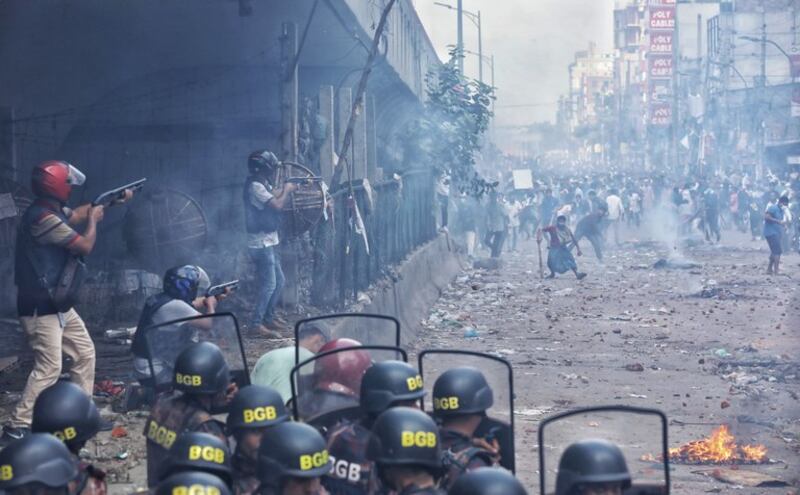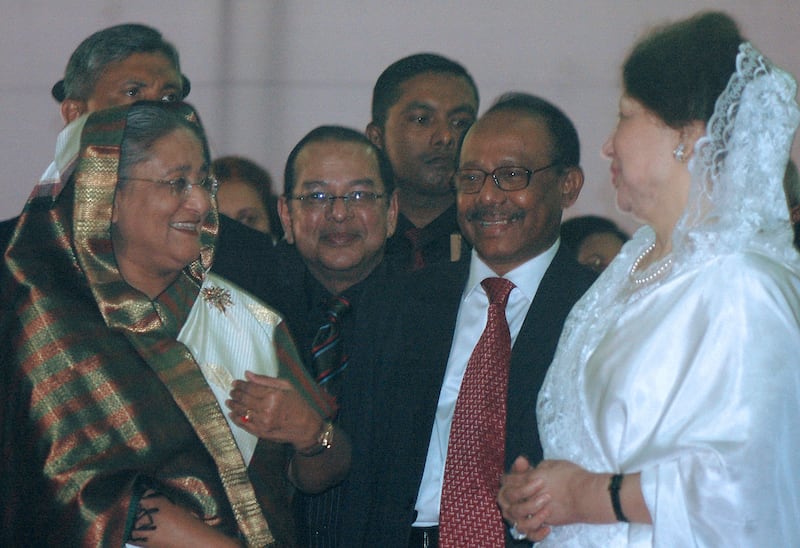Following a period of relative quiet, former Prime Minister Sheikh Hasina again sparked unrest in Bangladesh on the six-month anniversary of her ouster by a student-led popular uprising.
She angered those who participated in ending her brutal dictatorship by giving a speech on Feb. 5 via social media – from hiding in India – during which she alleged that the interim administration, which was formed by a consensus after she fled Bangladesh, was an “unconstitutional” power grab.
And she further inflamed passions by urging her supporters to resist the interim administration.
The protesters decided to send a message by destroying the former home of Hasina's father, the independence hero Sheikh Mujibur Rahman, around whom his daughter built a cult of personality during her tenure.
News clips uploaded on social media site X showed no footage of Hasina’s controversial speech, focusing on the destruction of the memorial – playing on a loop scenes of protesters setting fires in the building and taking hammers to its walls.

It is likely that Hasina and her supporters intended to provoke just such a response from the students. Predictably, her Awami League party highlighted the events as evidence of the growing lawlessness in the country.
While the interim administration’s leader, Chief Adviser Muhammad Yunus, expressed regret for the students’ actions, the damage had been done.
As I noted on social media, given the hatred that Hasina continues to inspire, it is abundantly clear that her goal is to see an “ungrateful” Bangladesh burn.
If nothing else, last week’s events may lead to the acceleration of a decision on the election timetable – one way or the other.
With the numerous opportunists at work both in Bangladesh and abroad, what happened on the sixth-month anniversary of Hasina’s ouster could tilt the power balance in favor of those who prefer a return to politics as usual instead of meaningful reforms.
Fresh tensions with Delhi
Hasina’s Feb. 5 speech and the events that followed have caused Dhaka to view New Delhi with even greater suspicion, since the ousted PM spoke from her sanctuary in India.
Ironically, these events transpired around the same time that Bangladesh's foreign adviser offered India a public olive branch via an op-ed in a national Indian newspaper.
While Dhaka has lodged a protest with New Delhi regarding these unfriendly acts, it should seek to avoid diplomatic isolation by rallying support from other friendly states.
Media reports said the two neighbors’ foreign ministers may meet on the sidelines of a conference Feb. 16-17 in Muscat, Oman.
Call for early elections
Some commentators have begun to predict a quick end to the interim government in the light of last week’s events.
They hope that India would use this opportunity to enlist U.S. support for its policy vis-à-vis Bangladesh during PM Modi’s visit to Washington to meet President Donald Trump this week.
India, the Awami League, and the country’s other major party, the Bangladesh Nationalist Party (BNP), have all been calling for early elections, even as their motives for the demand differ.
Meanwhile, those most interested in seeing reforms take hold prior to elections are the students and some emerging political parties.
For his part, Yunus, a 2006 Nobel laureate, has been consistently advocating for elections after 12 or 18 months, so that some basic reforms can take root first.

The Awami League and its supporters may feel they have won this round by playing the victim card.
But the emotions unleashed by the ousted PM’s speech on Feb. 5 appear to have galvanized her opponents to press forward with plans to ban the party from participation in future elections.
One interim government adviser (widely speculated to be involved in forming a new students’ political party) claimed there was a consensus among all other parties to ban the Awami League.
Nobody believes that Hasina or her party will return to power any time soon. She and party members face numerous charges for crimes against humanity and corruption.

What the Awami League seeks more than anything is to sideline the students and prevent reform.
For this, Hasina’s party is probably gambling on an overlap of interests with its long-time foe, the BNP, which is widely expected to win the next elections.
The Awami League is likely hoping the BNP will revert to past practices and blur the distinction between the two major parties, setting the stage for the return of the ousted party to Bangladesh politics.
Still, there is also an opportunity for Yunus and his student backers to leverage their considerable strengths to emerge with a mandate for essential reforms.
This gathering storm should serve as a reminder to all pro-democracy forces in Bangladesh that national unity in the face of external threats is the need of the hour.
Jon Danilowicz is a retired U.S. Department of State senior Foreign Service officer with extensive experience in South Asia. During his diplomatic career he undertook three stints in Dhaka, including service as Deputy Chief of Mission at the U.S. embassy. The views expressed here are his own and do not reflect the position of the U.S. Department of State or BenarNews.
